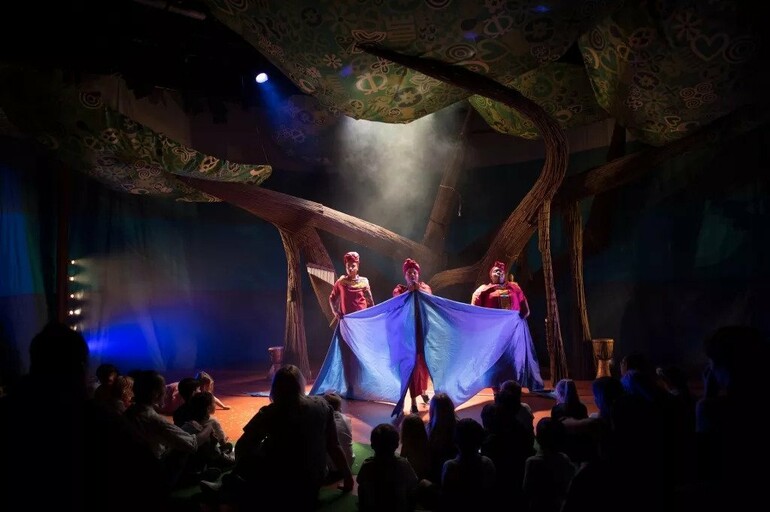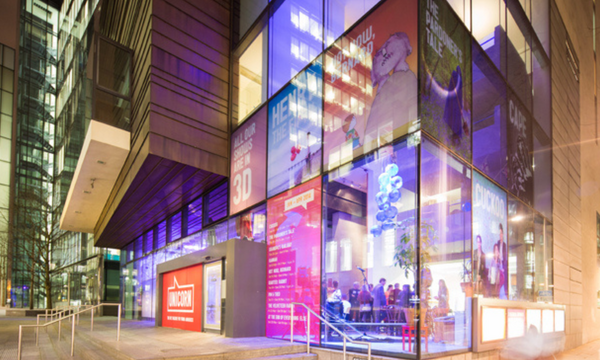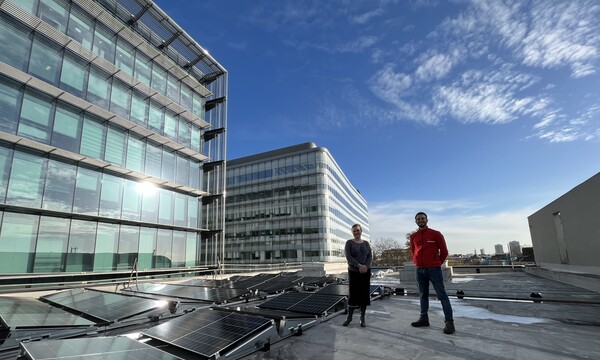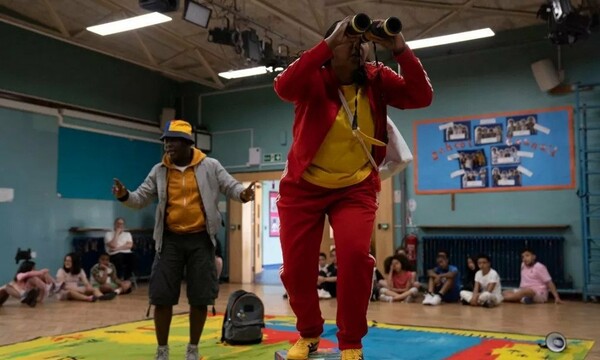News Story

We were so proud to win the Outstanding Achievement Award at the 2020 Creative Green Awards this November. To celebrate this win Frey, our Schools' Officer caught up with Jenn, our Production and Technical Director to learn more about the Green Team’s sustainable activity this year…
Hi Jenn! What led to your involvement in the Unicorn's Green Team, and the theatre's recent efforts in sustainability?
The Green Team has been around since before my time, with Amy (General Manager) and Adam (Building Maintenance Manager) doing a lot of work bringing the energy footprint of the building dand others realised our reason for existing, the stage work, wasn't a part of it in the same way. It doesn't make sense to me that we could have what could sometimes be a "wasteful stage" within an enviromentally-friendly building. That's why we decided on our Greening Our Productions process. In my new role (Production and Technical Director), and I can see how the building and artistic side of things intersect. As my work is making sure that the artistic plan actually ends up onstage, to safely, sustainably facilitate that artistic vision, I think it's fed into this.
Do you think there's a particular responsibility for theatres like the Unicorn, and organisations which make art more widely, to be sustainable?
I think that theatres absolutely have a responsibility, because I see theatres as mirrors for what's happening in the world. They're places where people go to make sense of our stories and our past, and I don't think there's any bigger, more important story right now than the climate emergency. The two naturally have to go together. And as we're a theatre for young people, we have to make an investment in their future.
How has the Covid-19 pandemic affected the Unicorn's green efforts so far? Could it have long term implications for theatres' green efforts?
We powered down in a much fuller way over lockdown, and discovered that that's okay! Sometimes there's a cultural storytelling in a building, an assumed "Oh, you can't turn that off! We never turn that off." But in lockdown, we did - and it was fine. My worry is that the strain of what's happened this year will make us separate the pandemic from being an environmental issue; theatres will want to prioritise getting back on our feet. But the desire to get back to "normal" and rebuild our lives is a desire to return, rather than to figure out what's next, and go about it in a different way. My hope is that we've learned some lessons from this, and recognise that the pandemic is a climate change issue, and our risk register will take this more fully into account in the future. I hope the slowing down has appealed to people, and doing less has triggered some thinking. I hope that continues.
The pandemic's pause has given us room to back our processes up and think; as we're not putting on a conventional Christmas show this year, we've got time to figure out the Christmas show next year. It's difficult right now, as theatres are on constantly shifting sands in terms of what can and can't do, but we have to be as forward-planning as we can. If we're constantly in a reactive mode, we can't move this forward.
How has working with creative teams and companies in the green-conscious way outlined in our Greening Our Productions guide been so far?
Though we published that guide in January, we'd implemented it for the whole season; so for instance on Anansi the Spider, the easy, standard scenic workshop way to have made its giant tree would've been to carve the whole thing out of polystyrene. The designer (Sadeysa Greenaway-Bailey) brought the design to us to discuss how we could do it together. That tree ended up being a welded metal armature, which we reused, that was then covered in cardboard tubes that we got for free from a carpet supplier, and then wrapped in natural willow branches - and then we had to make it fireproof! And the fire-retardant is not very environmentally-friendly, but we need it to be safe around small children. Everything's a jigsaw like that, and whenever anybody says, "Is it environmentally friendly or sustainable?" I ask, "Compared to what? Compared to a giant polystyrene tree?"
It's the corridor conversations, too. Catching a wardrobe supervisor to say "Please don't have five different options at a fitting," and explaining that eighty percent of what we buy online, we have to throw out - that's how we change mindsets. I think the biggest thing we've done to help our process is stand by our timeline, so sustainability is part of the conversation from the very beginning, permeating the whole process. So far, the response from those we work with has been amazing.
How do you think the Unicorn's green work impacts our audience?
I think in being honest about what we're trying to do, you invite people to go "Well, yes, but what about these fourteen things you're not doing yet?" But I think it's important to be transparent about the struggles as well as the wins. Similar to dealing with Covid-19, there's a Venn diagram in my head of things that actually work, and things the public want to see, and every now and then they cross over. We had massive feedback from our audiences asking why we had disposable coffee cups at our Unicornershop. So we switched over to disposable vegware, made from corn, and while our audience was pleased, the recycling company we use said "We can't compost these - the worms won't eat them, they clog up the system and have to go into landfill." It's about taking audience feedback and ideas (especially those of the kids, which are often brilliant), yet also being up-front about what does and doesn't work. Something we're talking about is adding green notes to every show, available on the website and on any freesheet, and using that to openly evaluate the sustainability of each show.
How do you personally find hope when faced with news and statistics about the climate emergency?
Getting outside, even in an urban environment. When we locked down, it took two weeks until there were trees growing out of the concrete at London Bridge - I find hope in that. There's a resilience in this planet which is beyond us, but we really have to get out of its way. And seeing how wild animals adapt to being in an urban environment - I love foxes and raccoons, how they're just getting on with it.
I appreciate that our executives and board are behind us; it would be so much more difficult if we were having to fight this way. This has to be a cultural shift, not just another duty we load onto what certain people at the theatre already do. Like embracing health and safety twenty years ago, it needs to be something we do without even thinking about it - like putting locks on a ladder before we climb up it.
Image: Jennifer Taillefer, Production and Technical Director



